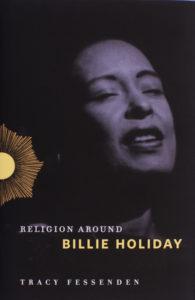Lecture Date: February 14, 2019

How did legendary jazz singer Billie Holiday (1915-1959) come by her distinctive style and sound? Tracy Fessenden listens for answers in the spiritual currents that surrounded Holiday during her brief but enormously influential career. From the Catholic convent in Baltimore where she was sent to live as a child, to the echoes of black Southern church sounds in the blues she first heard in brothels, to the secular riffs on ancestral faith in the poetry of the Harlem Renaissance, to the mostly-Jewish songwriting of Tin Pan Alley, religion mattered for Billie Holiday’s singing, Fessenden shows, and for the luminous icon she became. Religion Around Billie Holiday focuses broadly on the vernacular rituals and devotions that scholars have come to call “lived religion” the Catholicism of the streets, the Judaism of the stage, the Pentecostalism of the roadhouse or the concert arena alongside the religion Holiday encountered in institutions, doctrine, and ritual performance. Illuminating the surprising power of religion in the shaping of an American musical icon, Fessenden brings unexpected materials and archival voices to bear on the production—both the exquisite craft and the indelible persona—of Billie Holiday.
Speaker: Tracy Fessenden

Tracy Fessenden is the Steve and Margaret Forster Professor and the Director of the School of Historical, Philosophical, and Religious Studies at Arizona State University. She teaches and writes about religion at the intersection of politics, spiritual life, and artistic expression, with special attention to women’s lives. Her books include Culture and Redemption: Religion, the Secular, and American Literature (Princeton, 2007), a finalist for awards from the American Academy of Religion and the Berkshire Conference of Women Historians, and, with Linell Cady, Religion, the Secular, and the Politics of Sexual Difference (Columbia, 2013).